Historical pictures are likely the closest thing to time travel we have so far. From family gatherings to crucial events such as human rights demonstrations, they can be revisited thanks to photographers who decided to document them.
The Instagram account “Historical Leaks” shares some of the most interesting images from different periods of the past. Their educational and often awe-inspiring content has already gathered thousands of followers and continues to grow people’s interest in history. Scroll down for the pictures and feel free to upvote your favorites.
Bored Panda has reached out to “Historical Leaks” via Instagram and will update the article once we've heard back from them.
P.S. Make sure to check out their previous Instagram account for more interesting photos.
#1 “When I Told My Father I Was Going To Marry Jake He Said, ‘If You Marry That Man You Will Never Set Foot In This House Again.’
He was horrified that I could contemplate marrying a black man, and I soon learned that most people felt the same way. The first years of our marriage living in Birmingham were hell — I cried every day, and barely ate. No one would speak to us, we couldn’t find anywhere to live because no one would rent to a black man, and we had no money. People would point at us in the street. Then I gave birth to a stillborn son at eight months. It wasn’t related to the stress I was under but it broke my heart, and we never had any more children. Now it’s very hard to comprehend the prejudice we encountered, but you have to remember that there were hardly any black people in Britain in the Forties. I met Jake when he came over during the war from Trinidad, as part of the American forces stationed at the Burtonwood base near my home in Lancashire. We didn’t even know they spoke English, but Jake and I got chatting. He quoted Shakespeare to me, which I loved. Jake returned to Trinidad, but we carried on writing to each other, and a few years later he returned to the UK to get better paid work. 'No family came to our register office wedding in 1948... I do not regret marrying him for an instant, despite all the pain we have suffered' He asked me to marry him, quite out of the blue, when I was only 19. My father threw me out, and I left with only one small suitcase to my name. No family came to our register office wedding in 1948. But gradually life became easier. I got teaching jobs, ending up as a deputy head teacher. First Jake worked in a factory, then for the Post Office. Slowly we made friends together, but it was so hard. My father died when I was 30 and although we were reconciled by then, he never did approve of Jake. Today we have been married for 63 years, and are still very much in love. I do not regret marrying him for an instant, despite all the pain we have suffered.”
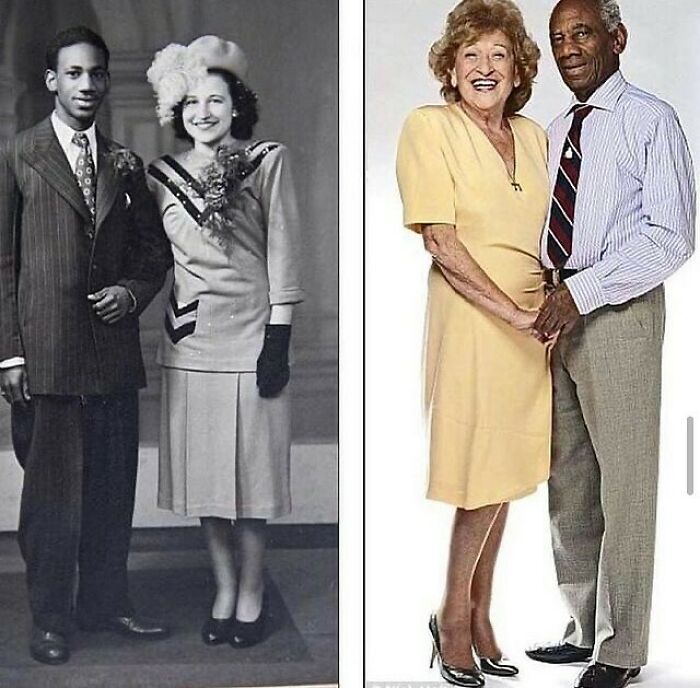
Image credits: historicaleaks
It is not only the visual representation of history in pictures that is captivating, but also the history of photography itself. It has come a long way from a box with a hole to a phone camera producing images of nearly professional quality.
You can trace the beginning of it to a thing known as Camera obscura. Translated from Latin, it means “dark room”, which is exactly what it is. The term describes a dark chamber with a small hole in one of the walls, which becomes the only source of light. The wall opposite the opening then projects an inverted image of the setting behind the hole.
Camera obscura became the foundation for a smaller, pocket-friendly version called a pinhole camera. It uses the same principle, but instead of a room, all you need is a small box with a dark-colored interior and a hole for the light to come through.
#2 The Date Was August 8, 1982. The Red Sox Were Playing An Afternoon Game At Boston's Fenway Park
Suddenly a screaming foul ball whizzed past the first base dugout and Red Sox left fielder Jim Rice heard the unmistakable sound of ball striking flesh. Looking around the corner of the dugout into the stands Rice saw 4 year old Jonathan Keane bleeding profusely from his head. Realizing in a split second that it would take several minutes for park EMT's to get to the scene, the future Hall of Famer sprang into action. Rice leaped over the railing into the stands, cradled the young fan into his arms and carried the boy into the dugout where he received immediate attention from the team's medical staff. Within just a few minutes Jonathan was rushed to the hospital where doctors credited Rice with saving the boys life. Jim Rice played the rest of the game in a blood stained uniform, a true badge of courage
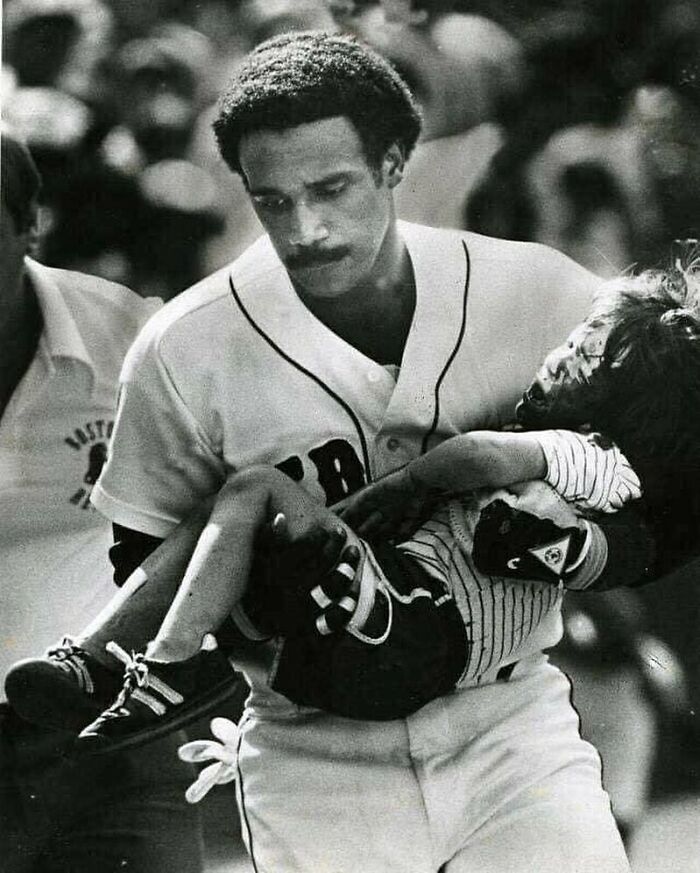
Image credits: historicaleaks
#3 In 1996, A Newborn Baby Girl Was Left In A Garbage Can Near The City Of Kolkata, India
Three friendly street dogs discovered and protected her for nearly two days, even attempting to feed the child before authorities were contacted and the young one was saved.
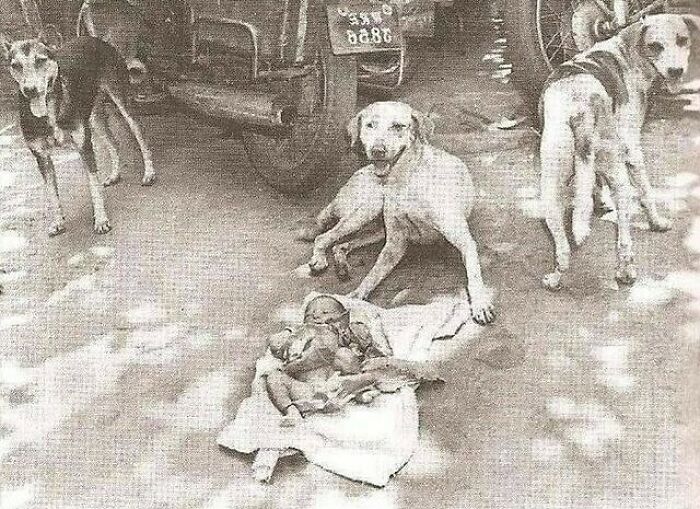
Image credits: historicaleaks
A pinhole camera was later developed with the help of an angled mirror that flipped the inverted view. However, that was not yet a picture as there was no way to imprint the image.
The first photograph ever taken is attributed to the French scientist Joseph Nicéphore Niépce. He was the mastermind behind heliography, a process of using sunlight to draw. By developing the technique, J. N. Niépce was eventually able to produce an image using a pewter plate. In 1826, he took the photograph “View from the Window at Le Gras” which some consider to be the start of modern photography.
#4 In 1969, When Black Americans Were Still Prevented From Swimming Alongside Whites, Mr.rogers Decided To Invite Officer Clemmons To Join Him And Cool His Feet In A Pool, Breaking A Well-Known Color Barrier
In 1969, when black Americans were still prevented from swimming alongside whites, Mr.Rogers decided to invite Officer Clemmons to join him and cool his feet in a pool, breaking a well-known color barrier
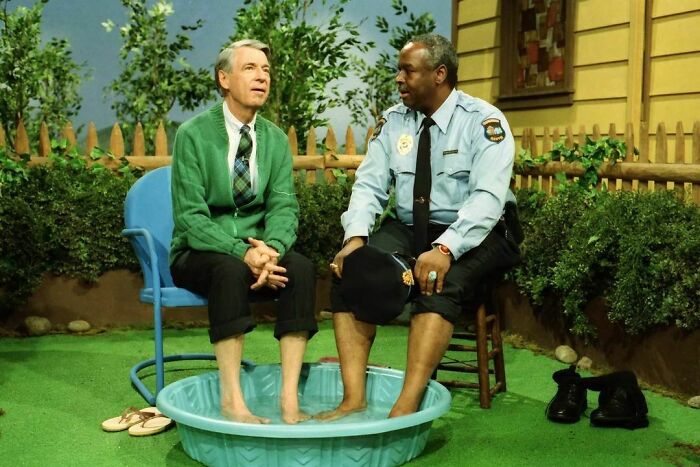
Image credits: historicaleaks
#5 Pictured Above Is Astronaut Leland D. Melvin's Official Nasa Portrait
When NASA astronaut Leland Melvin was assigned to a space shuttle mission in 2008, he was told he could bring his family for the official photo shoot wearing the famous orange “pumpkin suit.” They didn’t say two-legged or four-legged, and although dogs are not allowed on base at NASA, family is family. So, Melvin brought his rescue dogs Jake and Scout along with a neighbor to hold them and keep them quiet in the back of his van. “I got to the guard shack, flashed my badge, and I gunned the van and drove to the photo lab,” Melvin said. He then went up the back stairs where the photographer was waiting, went into the photo lab with 100 MilkBones to keep the dogs busy while he changed into the suit and came out. “They (the dogs) ran toward me, and I told the photographer to hold his finger on the shutter and that’s how the photo was born.” After the photo shoot, Melvin had to change and the MilkBones were gone. “The dogs started barking and a security guard came in and asked if there were dogs in there,” Melvin said. “We said, ‘No, that’s the doggy screensaver.’ ” After he changed he was able to quiet the dogs and get out of there
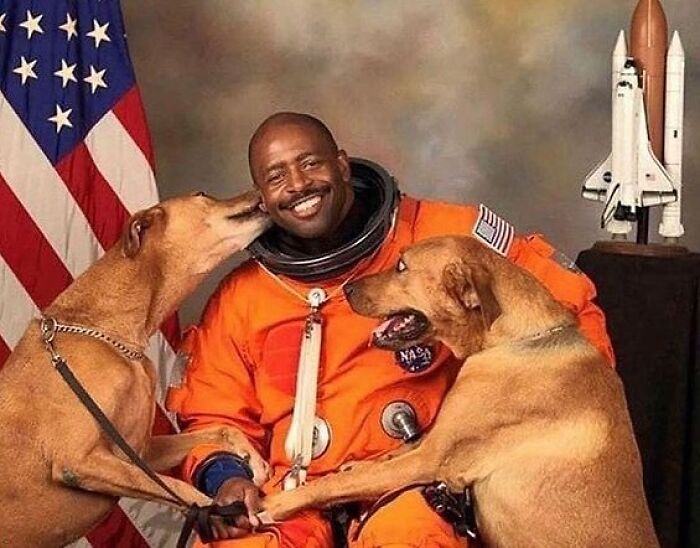
Image credits: historicaleaks
J. N. Niépce continued to develop the technique with the help of a French inventor, Louis Daguerre. After Niépce’s sudden death, his colleague carried on working with heliography. Eventually, he presented an approach of his own, known as the daguerreotype process. It allowed him to produce images in physical form using a silvered copper plate and chemical reactions.
#6 Best Friends Since Ww2
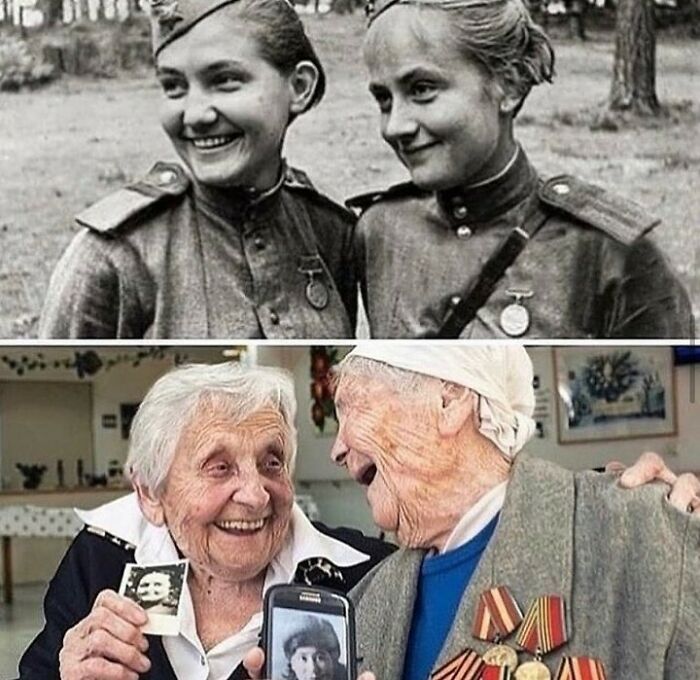
Image credits: historicaleaks
#7 The Pinocchio Incident, 1940

Image credits: historicaleaks
#8 A Photo From The Bush To Obama Transition, 2009
Here's an excerpt from a letter written by Barbara and Jenna Bush to Sasha and Malia. "...Sasha and Malia, here is some advice to you from two sisters who have stood where you will stand and who have lived where you will live: —Surround yourself with loyal friends. They'll protect and calm you and join in on some of the fun, and appreciate the history. —If you're traveling with your parents over Halloween, don't let it stop you from doing what you would normally do. Dress up in some imaginative, elaborate costume (if you are like us a pack of Juicy Fruit and a Vampiress) and trick-or-treat down the plane aisle. —If you ever need a hug, go find Ramsey. If you want to talk football, look for Buddy. And, if you just need a smile, look for 'Smiley.' —And, a note on White House puppies—our sweet puppy Spot was nursed on the lawn of the White House. And then of course, there's Barney, who most recently bit a reporter. Cherish your animals because sometimes you'll need the quiet comfort that only animals can provide. —Slide down the banister of the solarium, go to T-ball games, have swimming parties, and play Sardines on the White House lawn. Have fun and enjoy your childhood in such a magical place to live and play. —When your dad throws out the first pitch for the Yankees, go to the game. —In fact, go to anything and everything you possibly can: the Kennedy Center for theater, State Dinners, Christmas parties (the White House staff party is our favorite!), museum openings, arrival ceremonies, and walks around the monuments. Just go. Four years goes by so fast, so absorb it all, enjoy it all! ...Many people will think they know him, but they have no idea how he felt the day you were born, the pride he felt on your first day of school, or how much you both love being his daughters. So here is our most important piece of advice: remember who your dad really is."
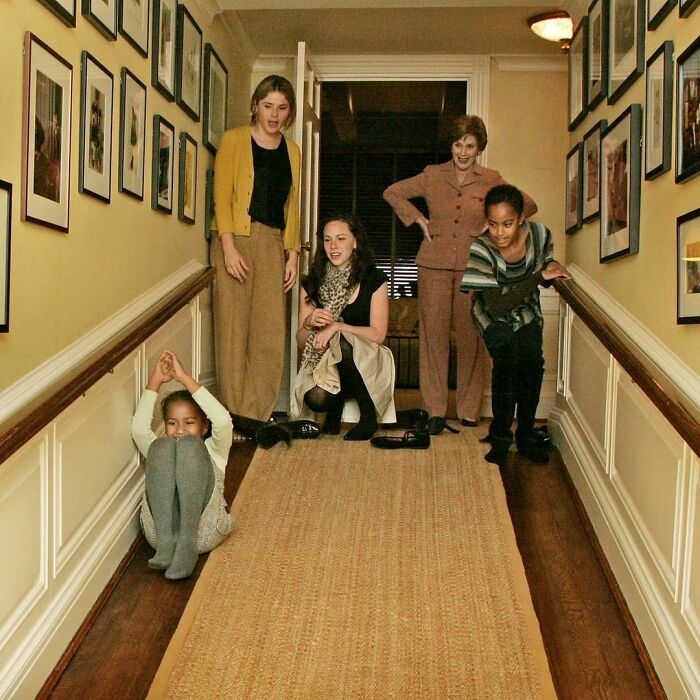
Image credits: historicaleaks
Further development of photography was pretty rapid. It only took around two hundred years to go from a box with a hole to your grandmother taking pictures with her phone. And they’re better than the professional ones in her days.
Research shows that nowadays people only take 7% of pictures with their cameras and use smartphones for 92.5%. It also unveiled that a person stores an average of 2,100 pictures on their phone.
#9 A Member Of The Harlem Hellfighters (369th Infantry Regiment) Poses For The Camera While Holding A Puppy He Saved During World War I, 1918
. The 369th Infantry Regiment, formerly known as the 15th New York National Guard Regiment and commonly referred to as the Harlem Hellfighters, was an infantry regiment of the New York Army National Guard during World War I and World War II. The Harlem Hellfighters were an African-American infantry unit in WWI who spent more time in combat than any other American unit. The regiment was nicknamed the Black Rattlers. The nickname Men of Bronze (French: Hommes de Bronze) was given to the regiment by the French and Hell-fighters (German: Höllenkämpfer) was given to them by the Germans. During WWI, the 369th spent 191 days in frontline trenches. They also suffered the most losses of any American regiment, with 1,500 casualties
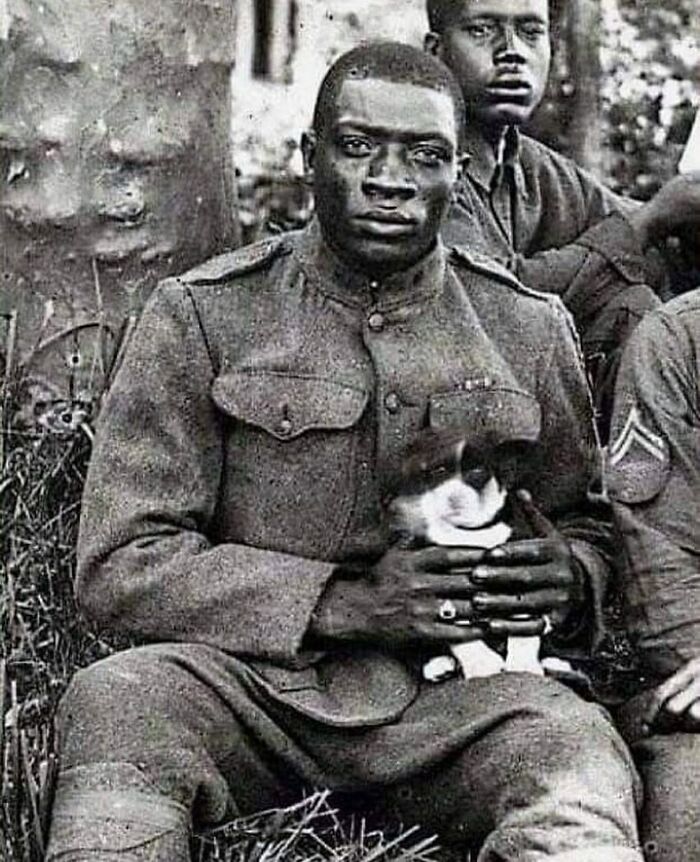
Image credits: historicaleaks
#10 Jewish Prisoners After Being Liberated From A Train That Was Taking Them To A Concentration Camp, 1945
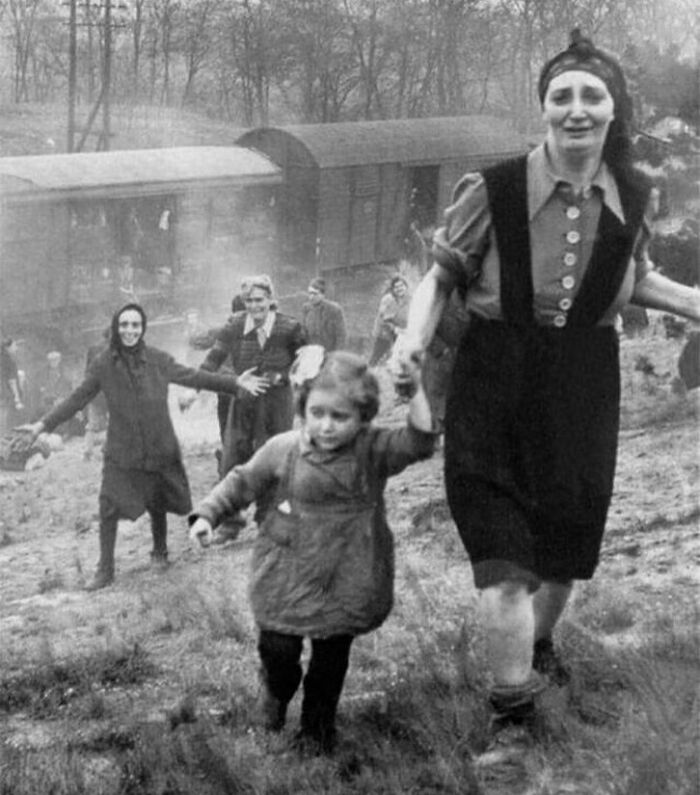
Image credits: historicaleaks
#11 During World War II, Gilbert Bradley Was In Love And Wrote Many Letters With His Loved One Who Signed His Letters With The Initial “G”
70 years later, it became known that the G it was a diminutive for Gordon. In that time homosexuality was illegal and they had to hide their relationship. In one of his letters he said: “Wouldn’t it be wonderful if all our letters could be published in the future in a more enlightened time. Then all the world could see how in love we are.”
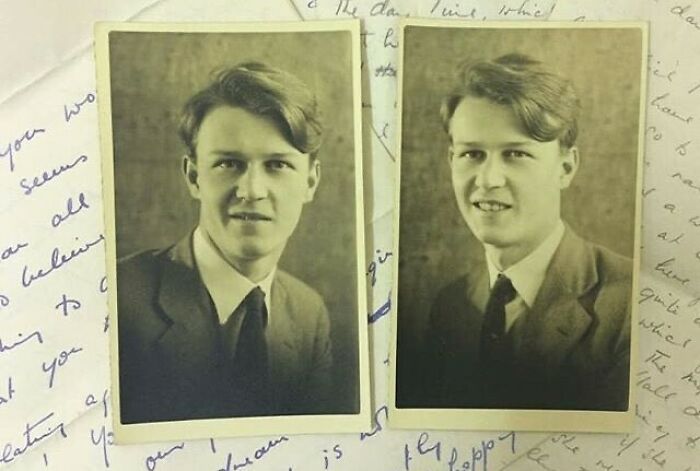
Image credits: historicaleaks
Let’s go back to a time way before the smartphone era. In 1839, an inventor and, surprisingly, a dentist, Alexander S. Wolcott, reached another milestone in photography. He was the first to get a patent for a camera, which was called the Daguerreotype mirror camera. Together with his partner, John Johnson, he was also arguably the first one to open a portrait studio.
#12 Marine Sergeant Frank Praytor Feeding An Orphaned Kitten. He Adopted The Kitten After The Mother Cat Died During The War, 1952
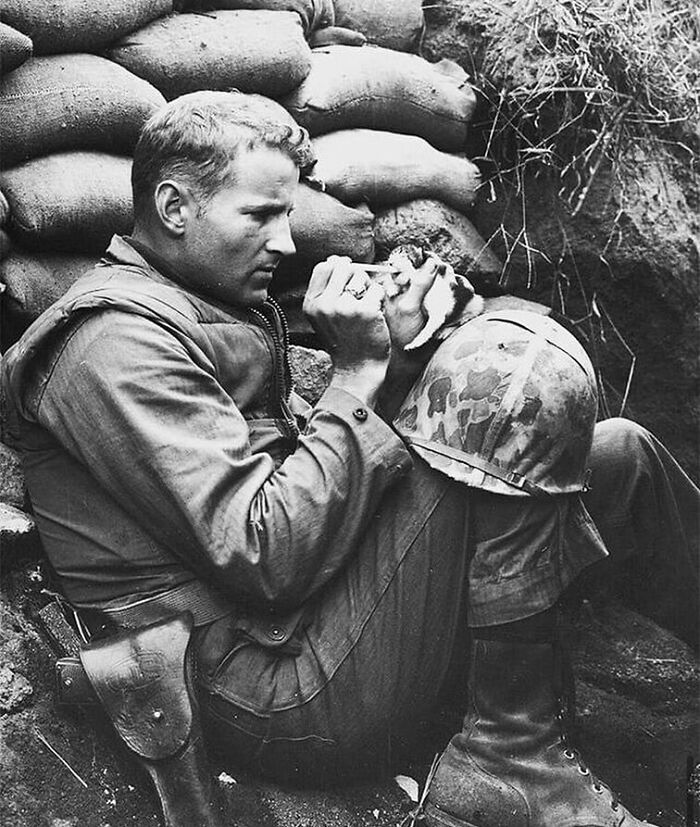
Image credits: historicaleaks
#13 In 1912, Jim Thorpe, A Native American, Had His Running Shoes Stolen On The Morning Of His Olympic Track And Field Event
He found this mismatched pair of shoes in the garbage and ran in them to win two Olympic gold medals that day. Thorpe was the first Native American to win a gold medal for the United States in the Olympics. Considered one of the most versatile athletes of modern sports, he won two Olympic gold medals in the 1912 Summer Olympics (one in classic pentathlon and the other in decathlon). He also played American football (collegiate and professional), professional baseball, and basketball.
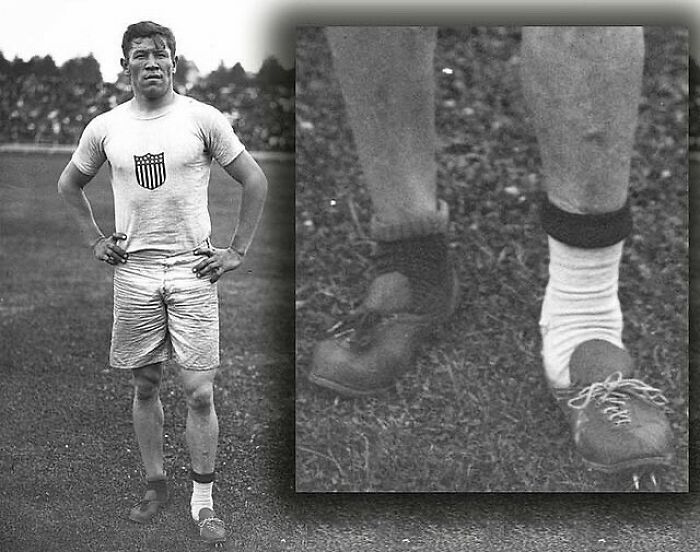
Image credits: historicaleaks
#14 The Kiss Of Life - A Utility Worker Giving Mouth-To-Mouth To Co-Worker After He Contacted A High Voltage Wire, 1967
Taken in 1967 by Rocco Morabito, this photo called "The Kiss of Life" shows a utility worker named J.D. Thompson giving mouth-to-mouth to co-worker Randall G. Champion after he went unconscious following contact with a low voltage line. They had been performing routine maintenance when Champion brushed one of the low voltage lines at the very top of the utility pole. His safety harness prevented a fall, and Thompson, who had been ascending below him, quickly reached him and performed mouth-to-mouth resuscitation. He was unable to perform CPR given the circumstances, but continued breathing into Champion´s lungs until he felt a slight pulse, then unbluckled his harness and descended with him on his shoulder. Thompson and another worker administered CPR on the ground, and Champion was moderately revived by the time paramedics arrived, eventually making a full recovery. What´s even more incredible is Champion not only survived this thanks to Thompson, but he lived an extra 35 years. He died in 2002 at 64 years old. Thompson is still alive today.
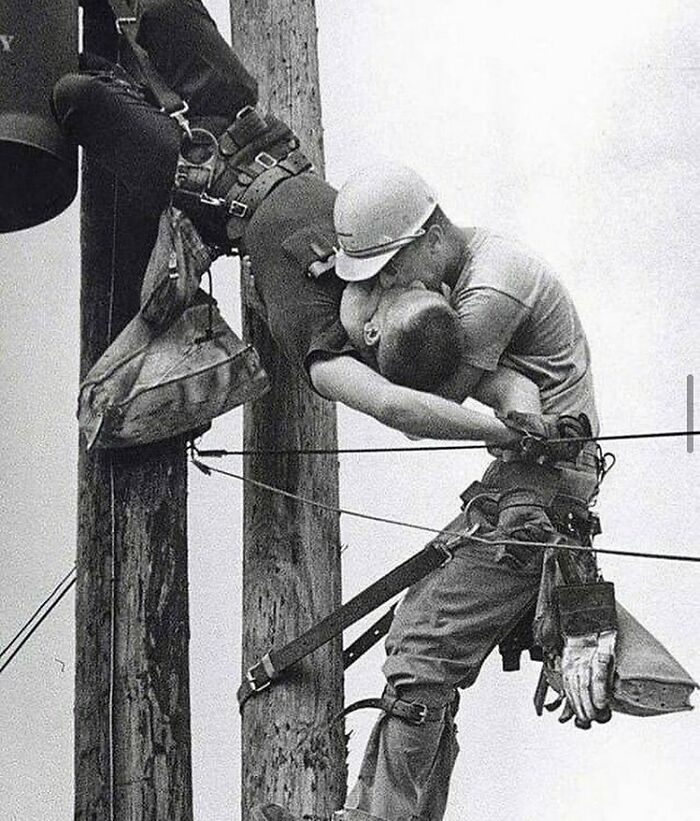
Image credits: historicaleaks
As photography was gaining popularity, people all over the world found ways to develop it. They managed to minimize the time of exposure and capture movement, among other things. That is how they achieved a breakthrough in the history of motion-picture presentations.
Photographer Eadweard Muybridge took pictures of a moving horse by lining a series of cameras along its way. While trotting along, the animal would move a thread attached to each camera and release the shutter. The result was a sequence of pictures of the horse at different points of movement. However, the series received skepticism from some people. Muybridge proved them wrong by using a lantern-slide projector and showcasing the images one after the other.
#15 Soldiers Paying Tribute To 8 Million Horses, Donkeys And Mules That Died During World War I, 1915
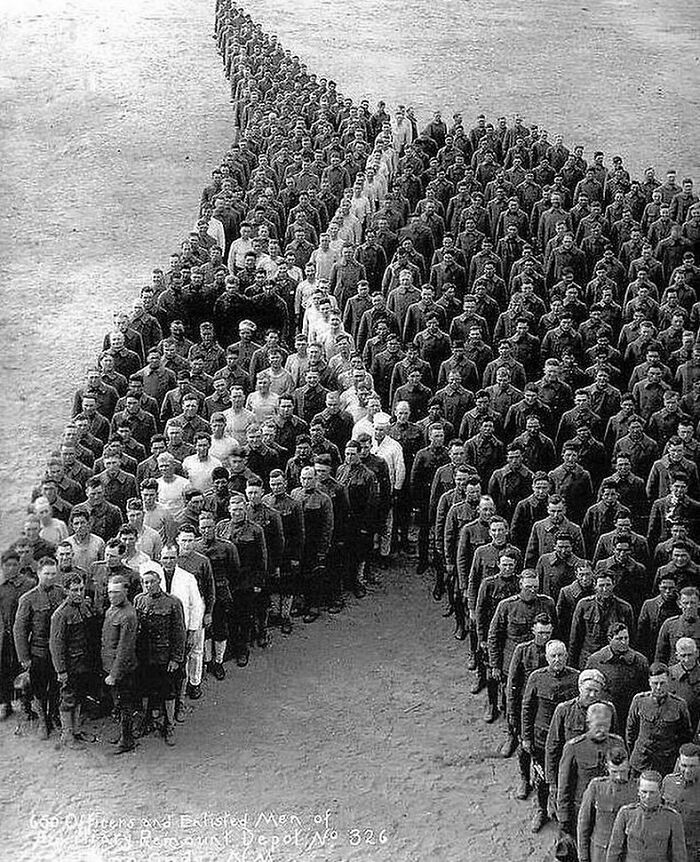
Image credits: historicaleaks
#16 A Dissatisfied Dental Patient, 1920s
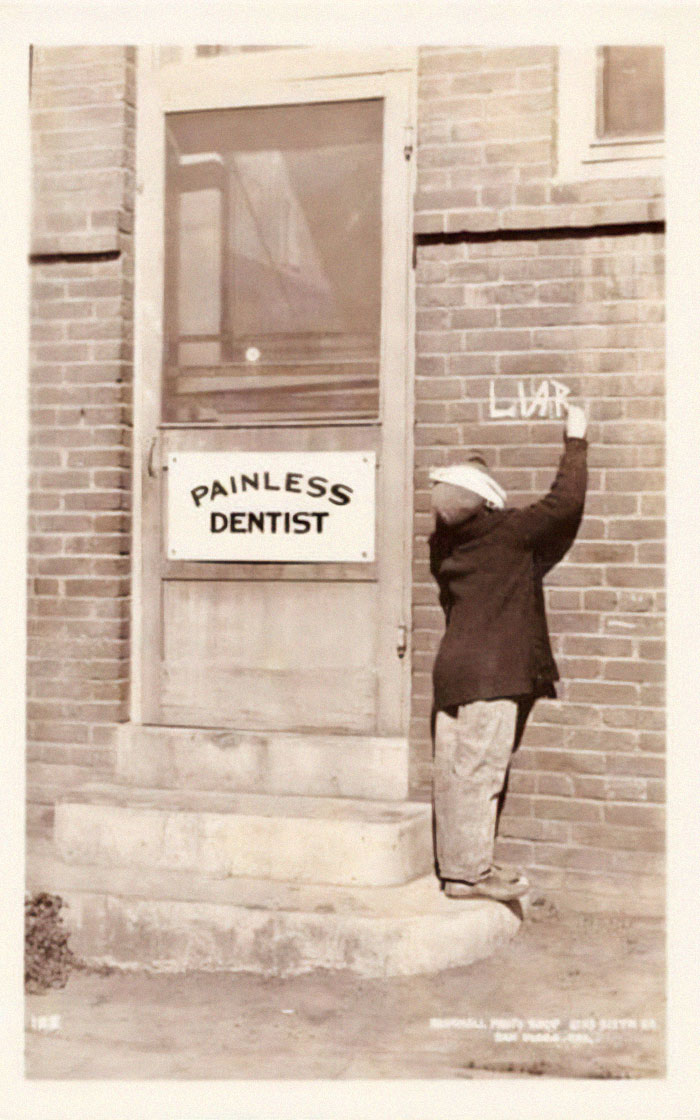
Image credits: historicaleaks
#17 Pnina Kaltman, Is The Small Girl On The Right. On The Left Is Her Sister. Against All Odds - They Both Survived The Holocaust, Along With Their Mother And Other Sister
They were the only kids who survived the war from their small village next to Chernivtsi, Ukraine. She was four years old when the war started and about 8 years old in this photo. It was taken in 1945, after the Red Army defeated the Nazis and took over their work camp in Obodivka. They survived because there was absolutely nothing their mother wouldn’t do to save their lives. Her name was Sima Perlmutter and she was a hero. Her granddaughter, @noamout said: “My grandmother has been and still is dedicating her life to tell her story to as many people as she can about this — it’s her lifelong project. She wants to make sure people never forget so that it never happens again. She wrote her testimony 16 years ago in Hebrew thinking no one would ever read it. I decided to translate her story to English as a surprise gift for her but then I realized I can do something much bigger than originally planned. Her story is now shared on countless of international Instagram pages, American publications and even going to be featured in a museum in Australia! She has absolutely no idea about any of this. I am taking screenshots of every comment, every story, any kind of mention and translating it to Hebrew. When I tell her about this, I will have fileus of people from all over the world talking about her story.”
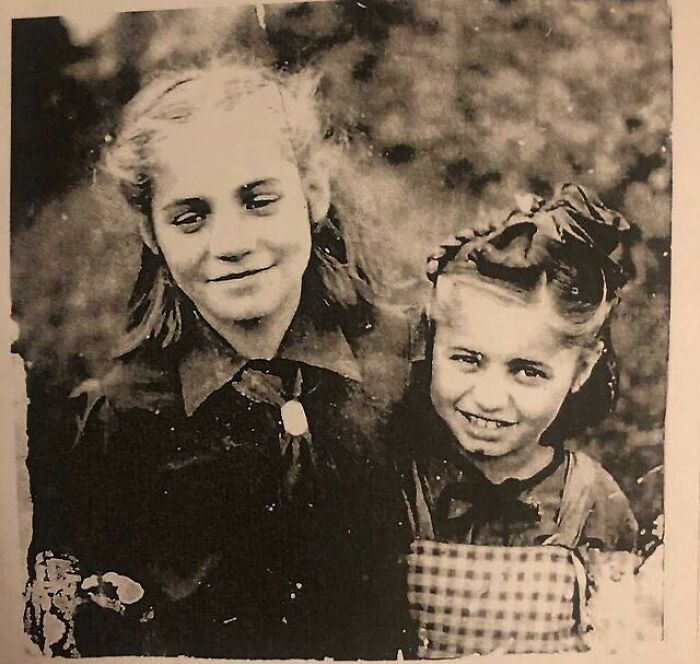
Image credits: historicaleaks
Another turning point in photography was the introduction of colored images. Auguste and Louis Lumière were among the first to start developing ways to do it in the early 20th century. However, the first color camera appeared only in 1935, when Leopold Godowsky, Jr., and Leopold Mannes invented the Kodachrome film.
#18 Polish Resistance Veterans Of The Warsaw Uprising (1944), Pictures Then And Now
The Warsaw Uprising (Polish: powstanie warszawskie; German: Warschauer Aufstand) was a major World War II operation, in the summer of 1944, by the Polish underground resistance, led by the Polish resistance Home Army (Polish: Armia Krajowa), to liberate Warsaw from German occupation. The uprising was timed to coincide with the retreat of the German forces from Poland ahead of the Soviet advance. The operation failed. In the end, German troops destroyed the majority of Warsaw during and immediately after the uprising. Among the demolished buildings was the Royal Castle. The Warsaw Uprising failed because of lack of support from the Soviets and British and American unwillingness to demand that Stalin extend assistance to their Polish ally. The Soviet advance in Poland stopped on the Vistula River, within sight of fighting Warsaw. Stalin had broken off diplomatic relations with the Polish government in exile when, in the spring of 1943, it asked the International Red Cross to investigate the killing of thousands of Polish officers at Katyn. The Polish officers were prisoners of the Soviets following its 1939 invasion of Poland in collaboration with Hitler. The Soviets tried to pin the blame on the Germans and did not admit the April 1940 summary executions of at least 21,000 Polish prisoners until some 50 years after the fact.
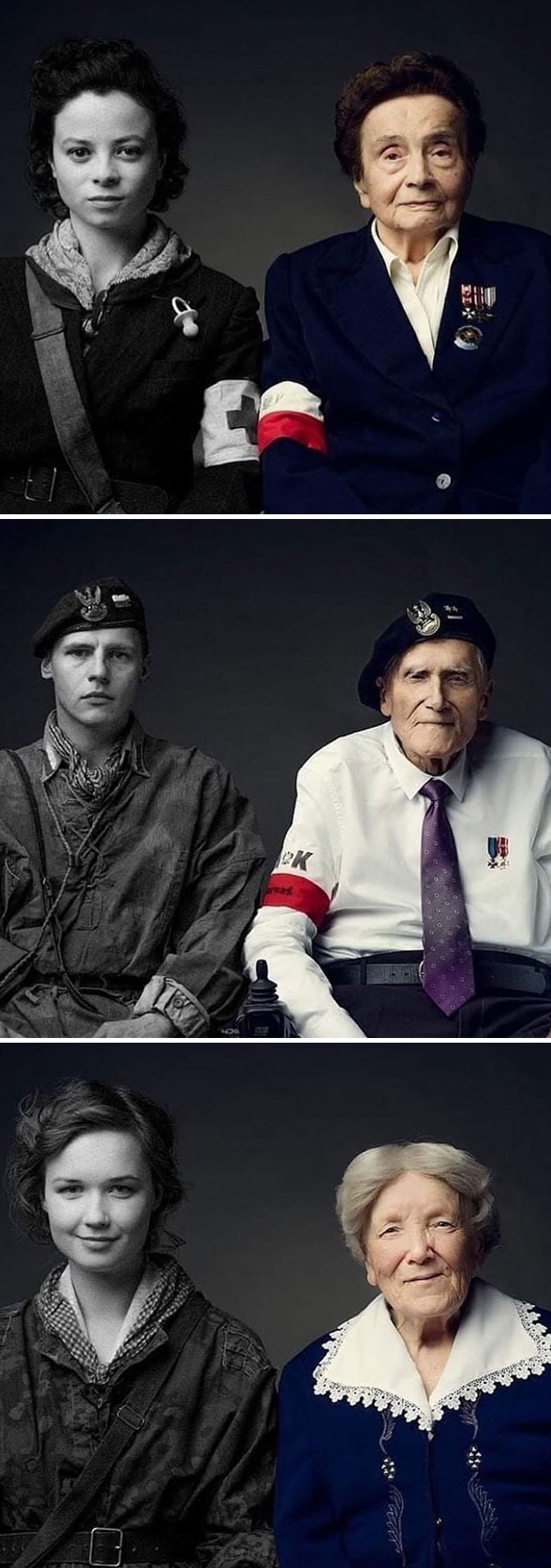
Image credits: historicaleaks
#19 The Last Photo Taken Of Hachiko On March 8, 1935
Hachiko was a Japanese Akita dog remembered for his unwavering loyalty to his owner. Hachiko, was an Akita dog that belonged to a professor at the University of Tokyo. Every day he would meet his master at Shibuya Station until one day in 1925 when the professor never returned. Unbeknownst to Hachiko, his master had suffered a fatal brain hemorrhage and would never come home again. But there Hachiko sat, day after day, waiting in vain for the return of his master. The story of the dog that never gave up gained a lot of attention from local and national news, inspiring many people to visit Hachiko at Shibuya Station to offer treats. Hachiko was found dead on a street in Shibuya in 1935. His owner’s wife and station staff sit around his body, mourning the loss of the faithful companion. Years later, a statue was erected in Hachiko’s honor and a replica of the original still stands near Shibuya Station
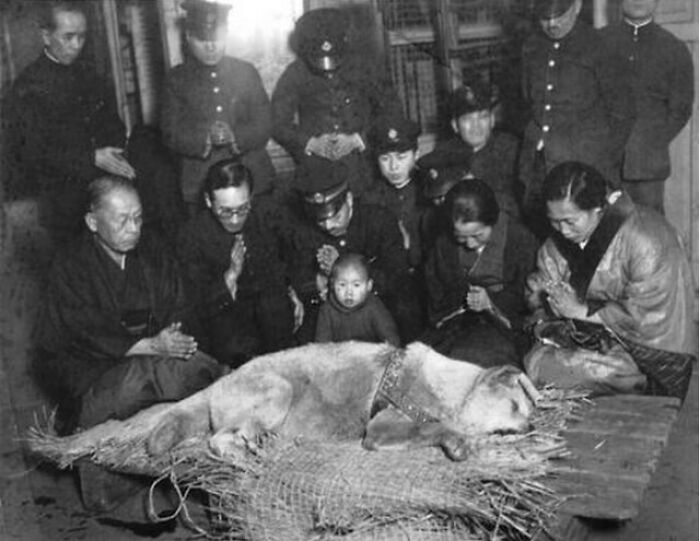
Image credits: historicaleaks
#20 Chinese Doctor Says Goodbye To His Wife Before Going To Wuhan To Help Treat Covid-19 Patients, China, 2020
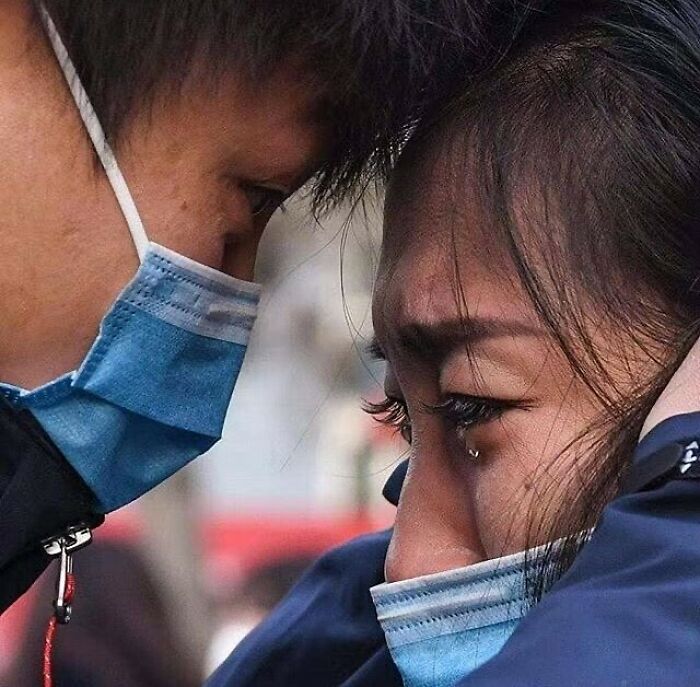
Image credits: historicaleaks
#21 Did You Know About This?
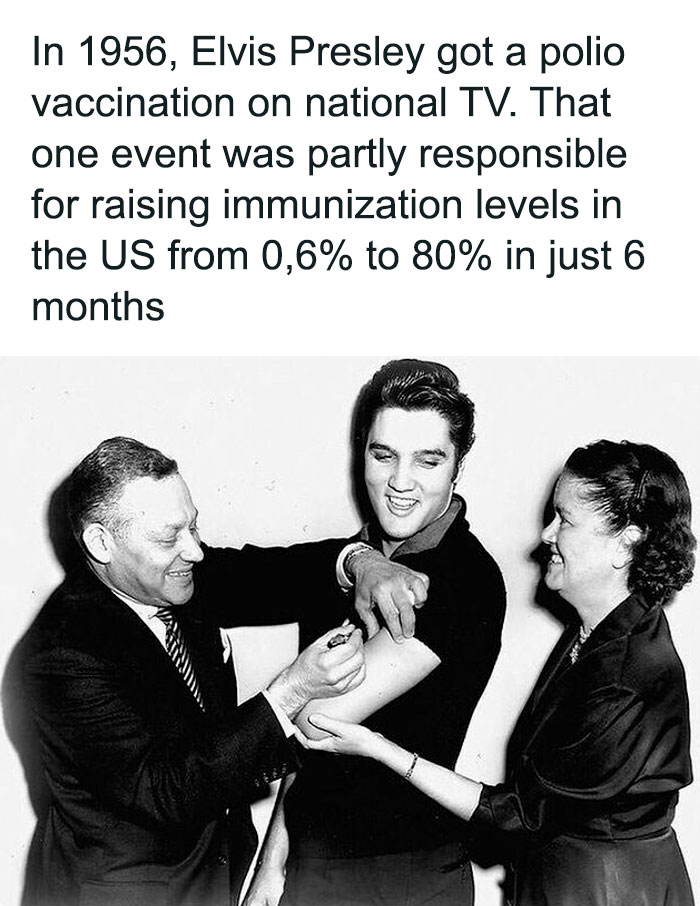
Image credits: historicaleaks
#22 Granny Winning First Prize For Her Marijuana Plant At The California City County Fair, 1973
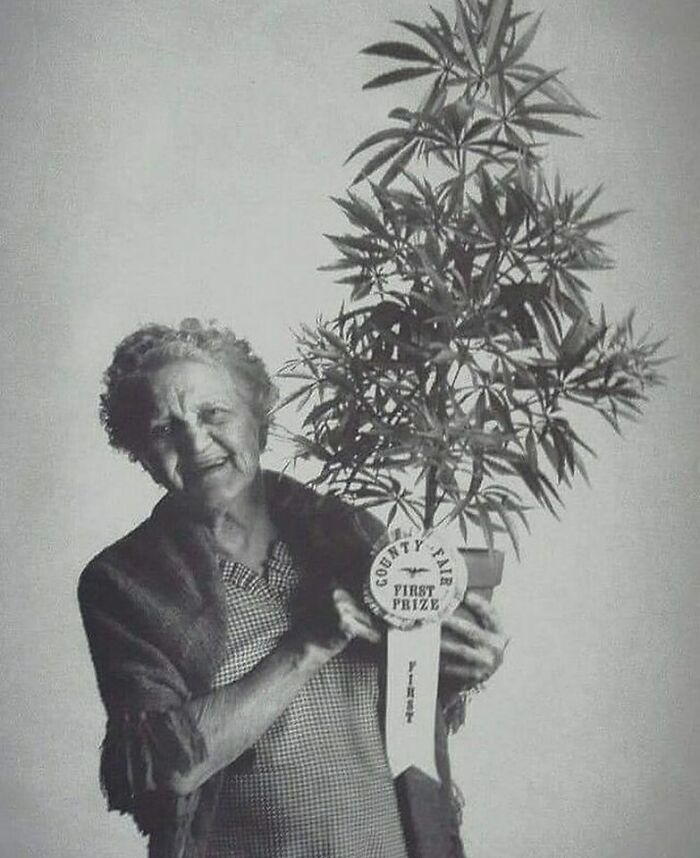
Image credits: historicaleaks
#23 Barack Obama With His Mother On Halloween, 1964
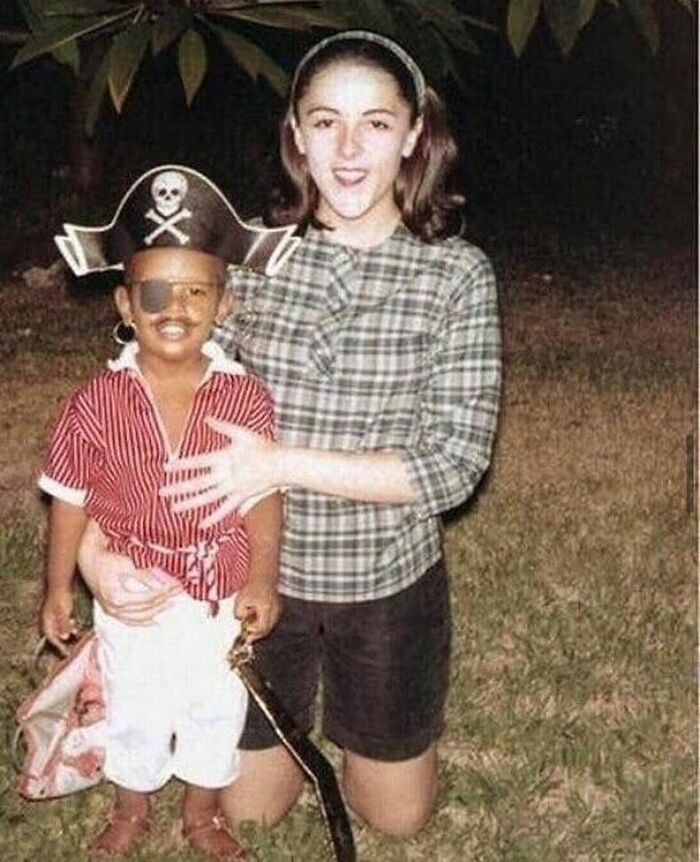
Image credits: historicaleaks
#24 Tereszka, A Girl Who Grew Up In A Concentration Camp Draws A Picture Of "Home" While Living In A Residence For Disturbed Children, 1948
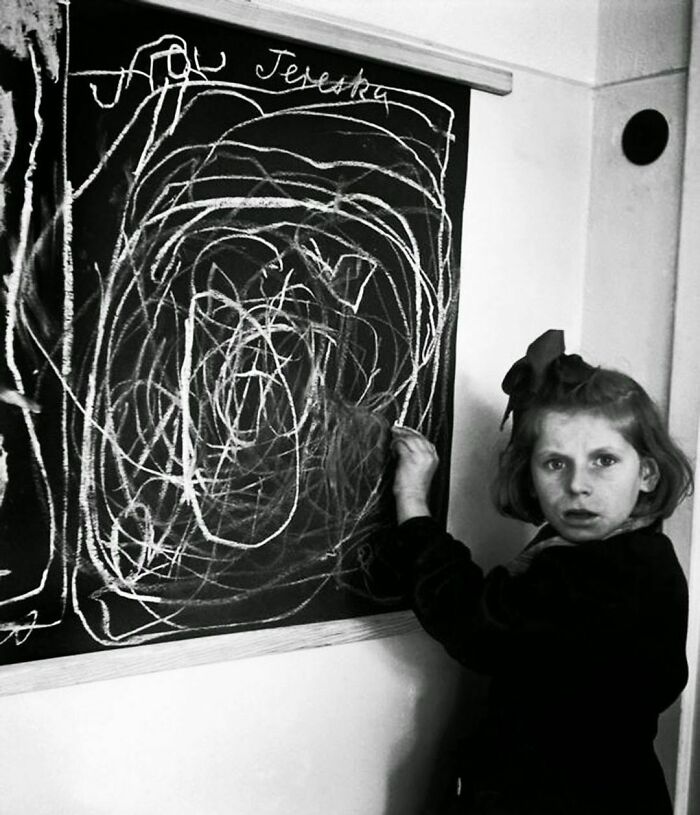
Image credits: historicaleaks
#25 Two Young Men Hold A Pre-Printed Sign Proclaiming Their Bond And Willingness To Be Legally Wed To One Another, Circa 1900
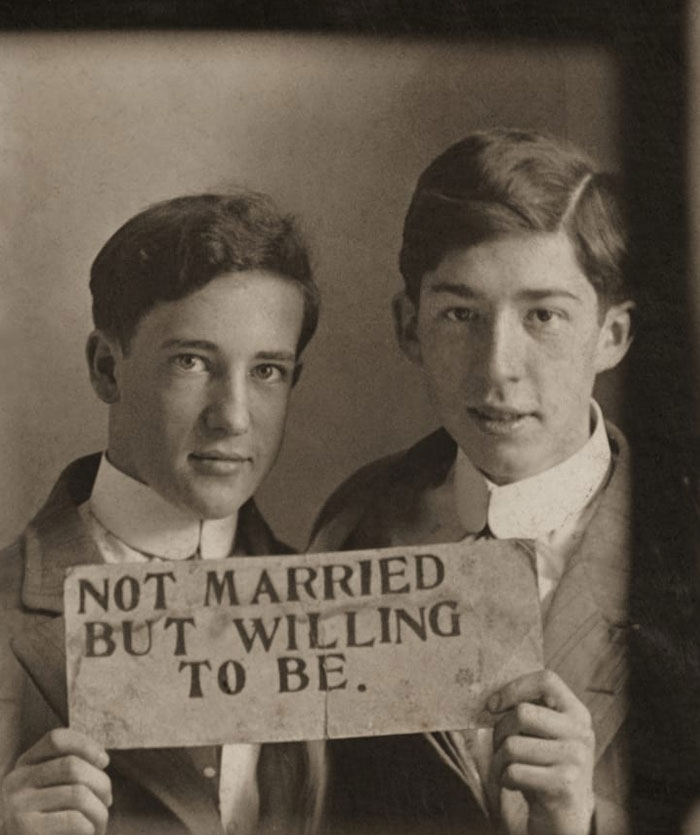
Image credits: historicaleaks
#26 A Highland New Guinean’s Reaction To Seeing A White Person For The First Time In His Life, 1930. Before This, They Thought They Were The Only Living People In The World
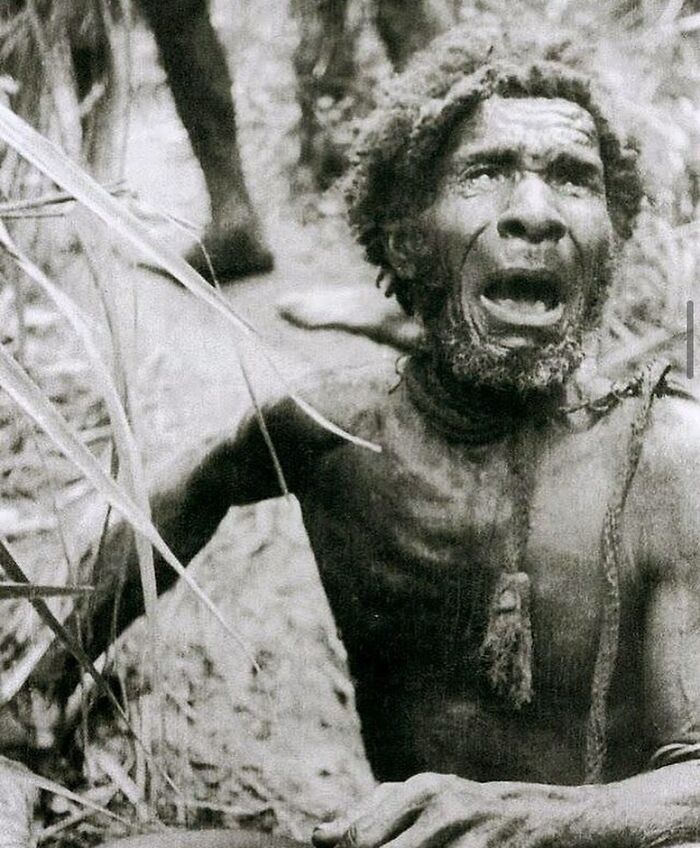
Image credits: historicaleaks
#27 During WWII, Jews In Budapest Were Brought To The Edge Of The Danube, Ordered To Remove Their Shoes, And Shot, Falling Into The Water Below. 60 Pairs Of Iron Shoes Now Line The River's Bank, A Ghostly Memorial To The Victims
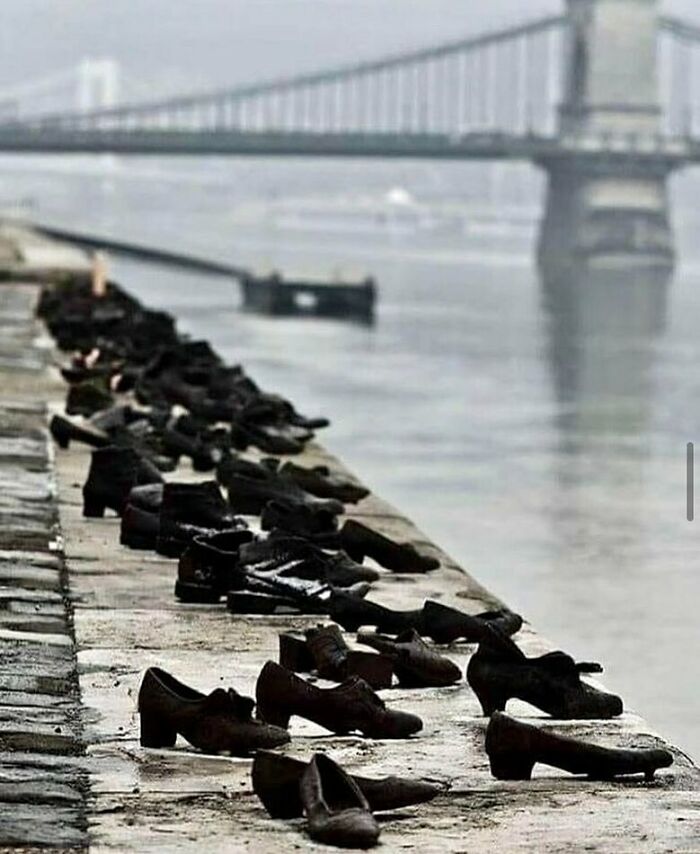
Image credits: historicaleaks
#28 Freddy Mercury And His Mother, 1947
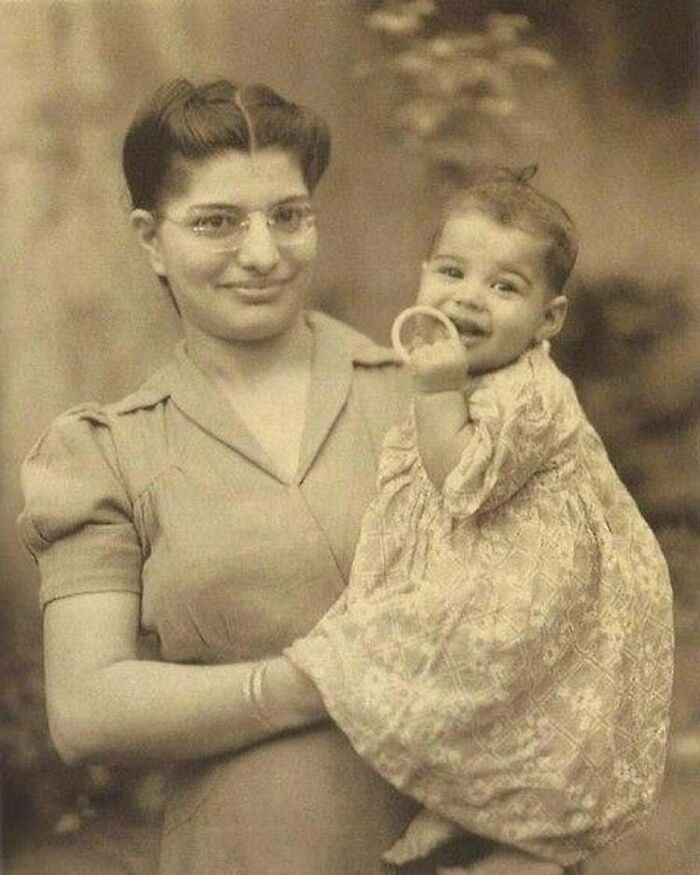
Image credits: historicaleaks
#29 Refusing To Do The Nazi Salute, 1936
The man in this picture is August Landmesser. Landmesser joined the Nazi Party in 1931 and began to work his way up the ranks of what would become the only legal political affiliation in the country. Two years later, Landmesser fell madly in love with Irma Eckler, a Jewish woman, and proposed marriage to her in 1935. After his engagement to a Jewish woman was discovered, Landmesser was expelled from the Nazi Party. Landmesser and Eckler decided to file a marriage application in Hamburg, but the union was denied under the newly enacted Nuremberg Laws. The couple welcomed their first daughter, Ingrid, in October 1935. And then on June 13, 1936, Landmesser gave a crossed-arm stance during Hitler's christening of a new German navy vessel. The act of defiance stands out amid the throng of Nazi salutes. In 1937, fed up, Landmesser attempted to flee Nazi Germany to Denmark with his family. But he was detained at the border and charged with "dishonoring the race," or "racial infamy," under the Nuremberg Laws. A year later, Landmesser was acquitted for a lack of evidence and was instructed to not have a relationship with Eckler. Refusing to abandon his wife, Landmesser ignored Nazi wishes and was arrested again in 1938 and sentenced to nearly three years in a concentration camp. He would never see the woman he loved or his child again. Eckler is believed to have been transferred to what the Nazi's called a "euthanasia center" in 1942, where she was murdered with 14,000 others. After his prison sentence, Landmesser worked a few jobs before he was drafted into war in 1944. A few months later, he was declared missing in action in Croatia.
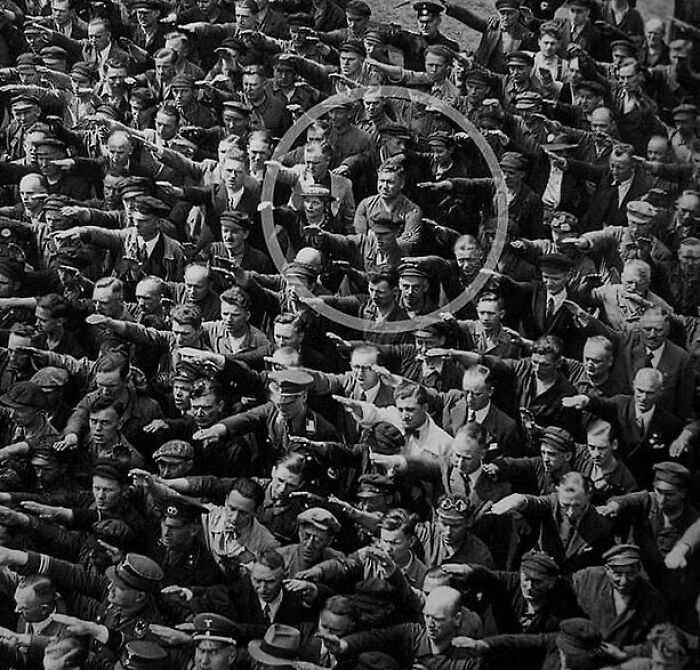
Image credits: historicaleaks
#30 A Woman Smiling And Goofing Around While Taking Photos, Late 1800s
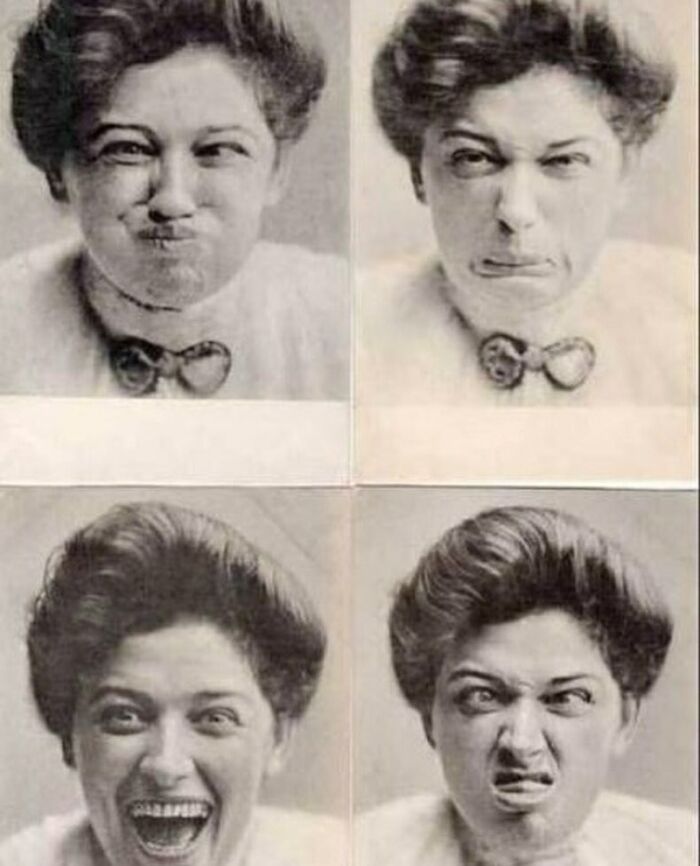
Image credits: historicaleaks
#31 A Man Guards His Family From The Cannibals During The Madras Famine Of 1877 At The Time Of British Raj, India
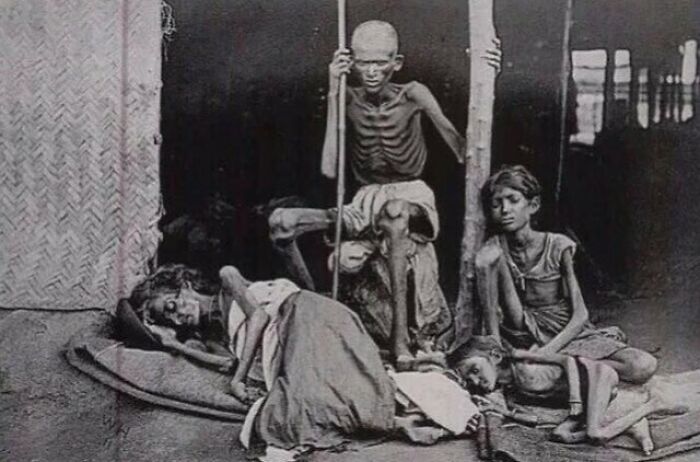
Image credits: historicaleaks
#32 A German Soldier Returns Home From War Only To Find His House Bombed, And Family Perished In The Remains, Frankfurt, 1946
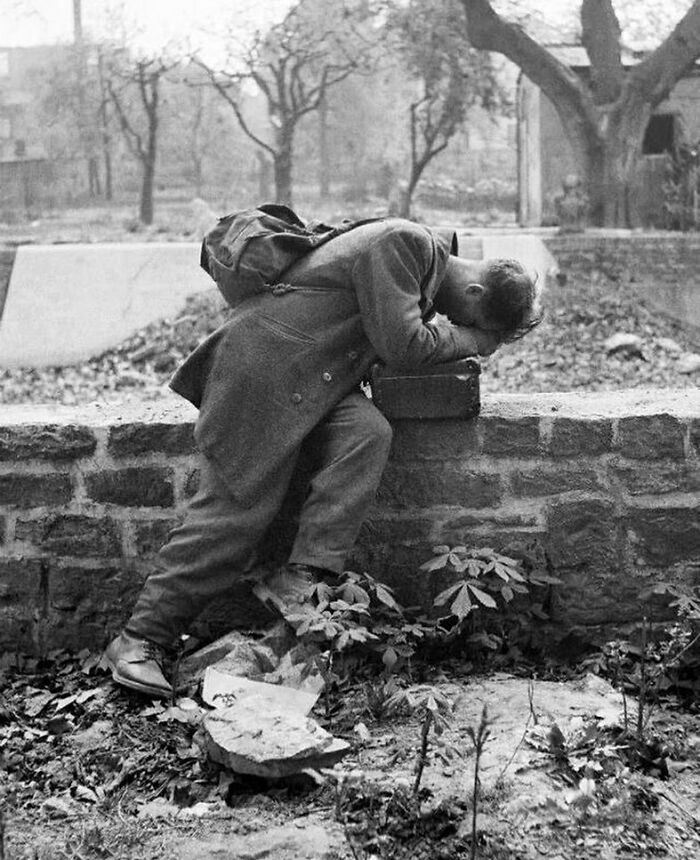
Image credits: historical.leaks
#33 Theodore Roosevelt’s Diary Entry On Valentine’s Day, After His Wife And Mother Died Within Hours Of Each Other On The Same Day, 1884. He Wrote:’x.. The Light Has Gone Out Of My Life.’
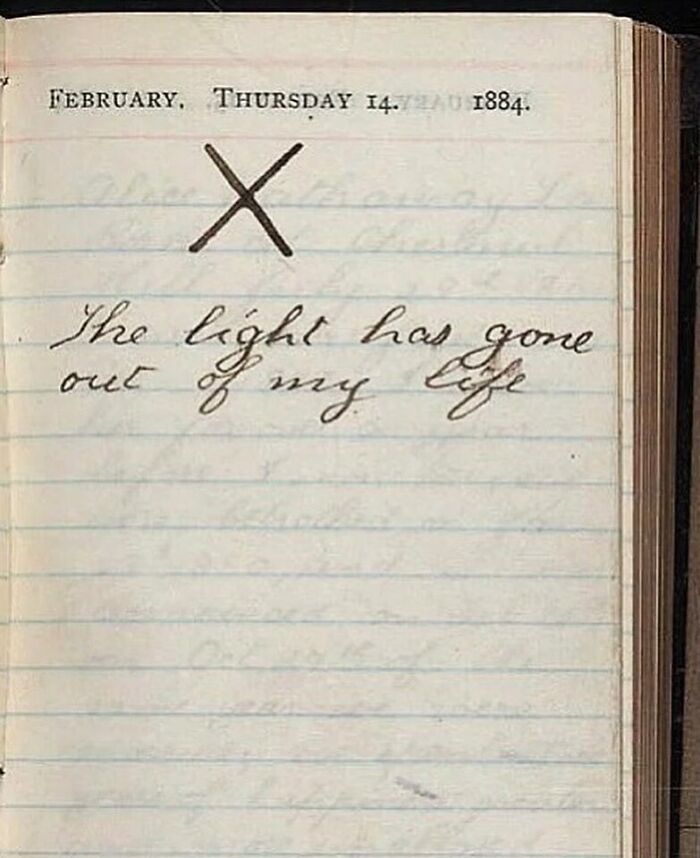
Image credits: historicaleaks
#34 The Moment Goebbels (Minister Of Nazi Propaganda) Found Out His Photographer Eisenstaedt Was Jewish, 1933
This photo is known as "Eyes of Hate". In September 1933, LIFE magazine photographer Alfred Eisenstaedt traveled to Geneva to document a meeting of the League of Nations. Eisenstaedt was a German-born Jew. Not knowing this at first, Goebbels was initially friendly toward Eisenstaedt, who was able to capture a number of photos showing the Nazi politician in a good and cheerful mood. However, Goebbels soon learned of the Jewish blood flowing through Eisenstaedt's veins. Subsequently, when Eisenstaedt approached Goebbels for a candid portrait, the politician's expression was very, very different. Here's what Eisenstaedt later shared regarding experience: "I found him sitting alone at a folding table on the lawn of the hotel. I photographed him from a distance without him being aware of it. As documentary reportage, the picture may have some value: it suggests his aloofness. Later found him at the same table surrounded by aides and bodyguards. Goebbels seemed so small, while his bodyguards were huge. I walked up close and photographed Goebbels. It was horrible. He looked up at me with an expression full of hate. The result, however, was a much stronger photograph. There is no substitute for close personal contact and involvement with a subject, no matter how unpleasant it may be. He looked at me with hateful eyes and waited for me to wither. But I didn't wither. If I have a camera in my hand, I don't know fear." On August 14, 1945, Eisenstaedt photographed a sailor celebrating Japan's surrender by kissing a random nurse in New York City. The photo came to be known as “V-J Day in Times Square.”
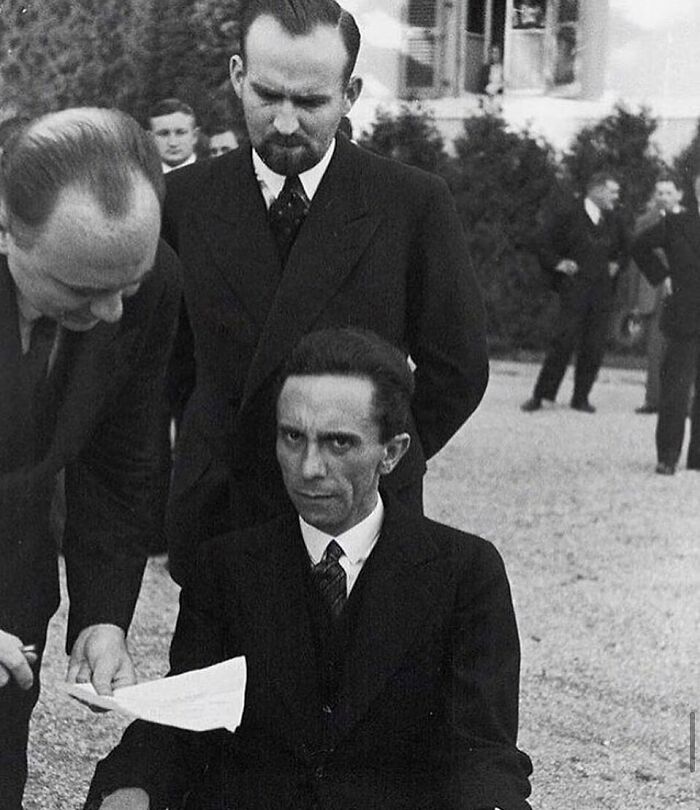
Image credits: historicaleaks
#35 The Eruption Of Mount St. Helens, 1980
Some background info by a friend of the man who took this photo: "He pulled some background info by a friend of the man who took this photo: "He pulled over and attempted to turn around seeing as the ash cloud was heading his way and fast. In his hurry he bent the forks on his motorcycle. He jumped out of the car and ran up the hillside to get some pics, thinking he might just die for it, and hoping someone would find the camera at least as it was a phenomomenal sight that filled the sky. The first picture he took was the one with the Pinto cocked in the road and the bent motorcycle still in the back with that HUGE cloud going up in the sky in the background. He made his way back down the mountain after being quickly overtaken by the ash cloud. He was completely blinded, and had to drive on the opposite side of the road steering by staying right on the opposite side of the road heading into oncoming traffic, but encountered nobody going up. The car choked out after a while and he rode his bent motorcycle out of the mountains back to the room he had rented. The next day as soon as he could, he rode his motorcycle back up into the now really hot zone with his camera to get what pics he could. He was well into the red no go zone, when a helicopter saw him, and came right down and landed in his path. He was surprised to be arrested on the spot and flown out in the chopper and to jail. They left his motorcycle lay on the mountain. They also kept him in jail for a few days without letting him call anyone or even plead his case. When he finally got out, he again went back up there, (Not sure how) and was able to get his motorcycle back and I think later his car as well."

Image credits: historicaleaks
#36 Pictured Above Is A Rwandan Man With Amasunzu Hairstyle, 1923
Amasunzu is a traditionally Rwandan hairstyle that was once worn by men, as well as by unmarried women in order to indicate to potential suitors that they were single and of marriageable age. Rwandans used to wear the amasunzu style in more than 30 different ways. A man was identified as powerful, noble and brave if they had the hairstyle. It also showed prestige, especially among men. According to theatre and film artiste John Kennedy Mazimpaka, 54, there were even competitions on who had the best amasunzu design. “The young were always very anxious to be old enough to sport the style,” he said. Although the amasunzu has fallen out of style in recent decades, it is currently experiencing a revival in popular interest
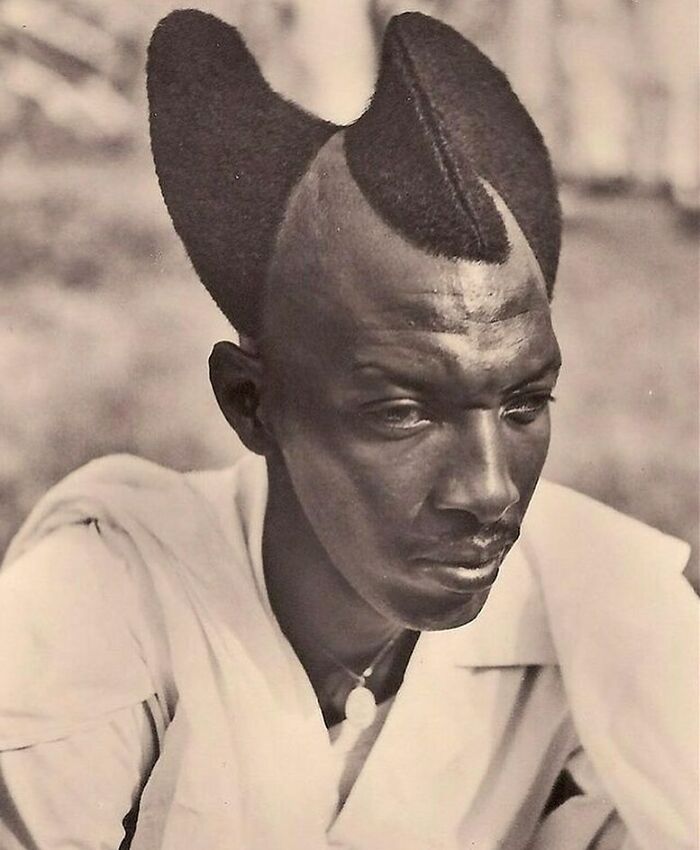
Image credits: historicaleaks
#37 Pictured Is A Girl From The Kiowa Tribe In 1894
Kiowa people are a Native American tribe and an indigenous people of the Great Plains of the United States. They migrated southward from western Montana into the Rocky Mountains in Colorado in the 17th and 18th centuries, and finally into the Southern Plains by the early 19th century. In 1867, the Kiowa were moved to a reservation in southwestern Oklahoma
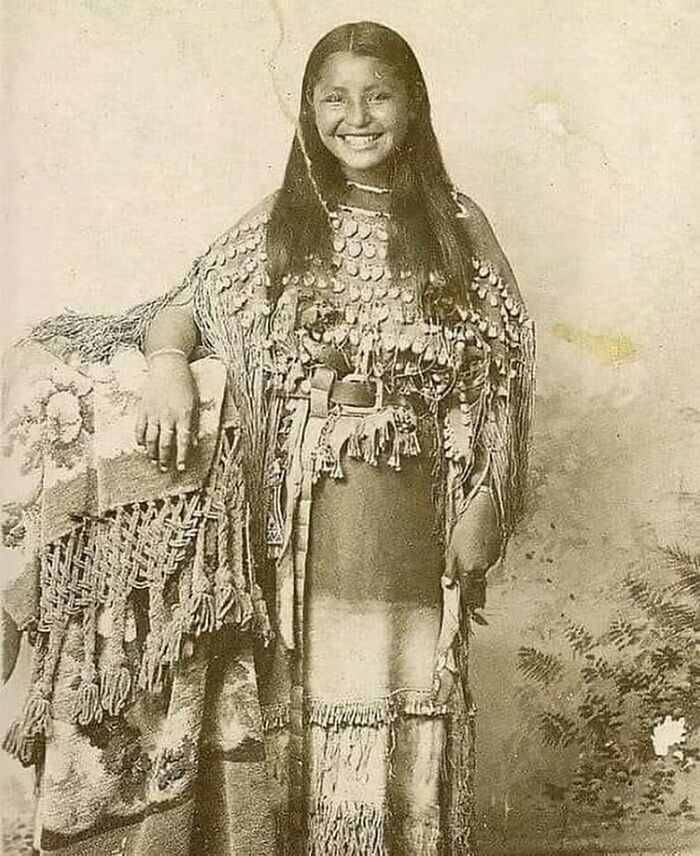
Image credits: historicaleaks
#38 Studio Photos Of Two Women, 1900s
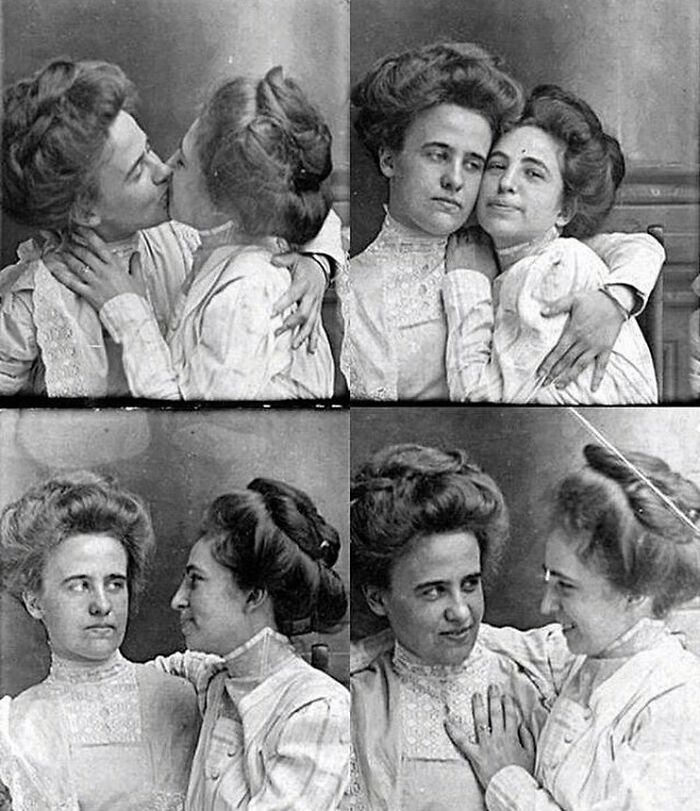
Image credits: historicaleaks
#39 A Young Man Demonstrating Against Low Pay For Teachers, C. 1930s
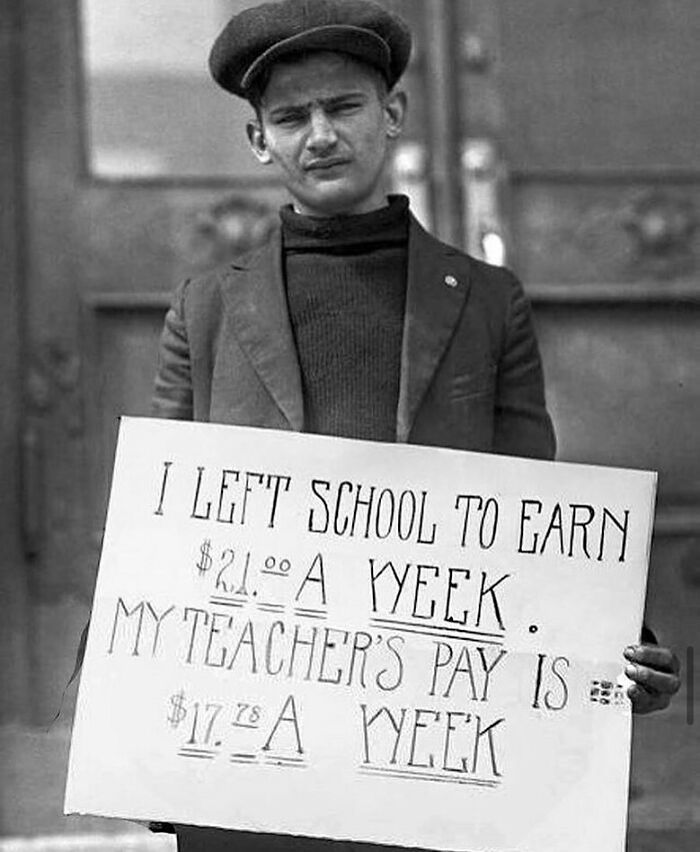
Image credits: historicaleaks
#40 A Young Man Giving Princess Diana Flowers With A Little Help From His Friends, 1989
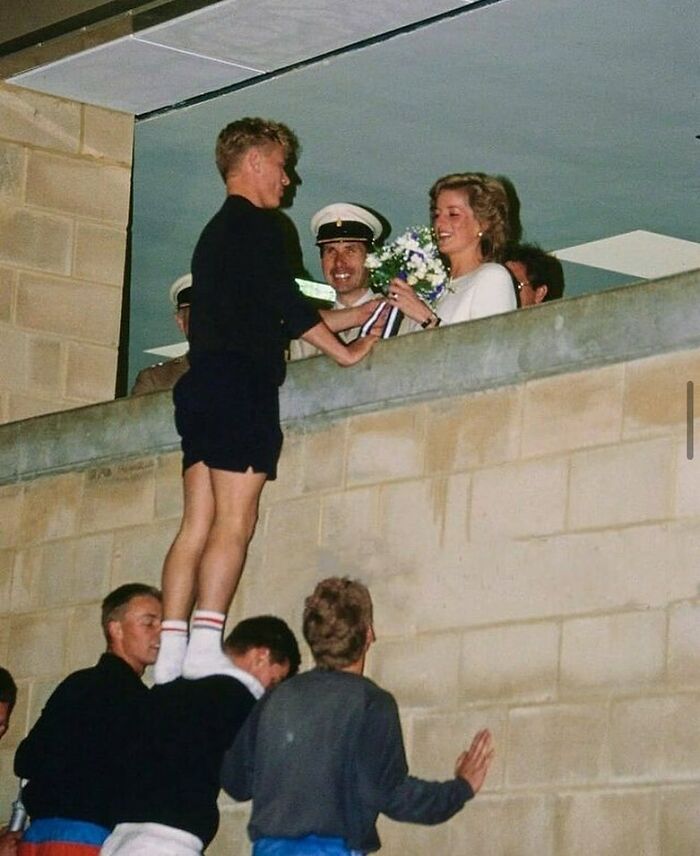
Image credits: historicaleaks
#41 Pictured Above Is Gunnar Kaasen. He And His Team Of 13 Dogs, LED By The Siberian Husky, Balto, Completed The Last Leg Of A 1925 Trip To Deliver 300,000 Units Of Diphtheria Antitoxin To Nome, Alaska
They traveled by night in temperatures of -23° F (-31° C). Kaasen came to the United States to mine for gold in 1903, and settled in Nome, where he became an experienced musher. When diphtheria hit the town and the lone doctor's supply of serum was found to be expired, Kaasen was one of twenty mushers who worked to transport 300,000 units of serum to Nome from Nenana, Alaska. The mushers and the combined teams of over one hundred dogs experienced subzero temperatures, severe winds and whiteout conditions. A number of dogs froze to death during their leg of the journey. After the serum run, Kaasen and his lead dog, Balto, were dogged by publicity, glorified as though they had made the entire journey themselves, even though there were nineteen other mushers who were part of the chain, one of whom made a longer run than Kaasen and his team. He and Balto even starred briefly in a movie about Balto. He was accused of being a publicity hog, but he had his defenders as well. Kaasen and his wife Anna moved to Everett, WA, in 1952, where he died of cancer at the age of 78
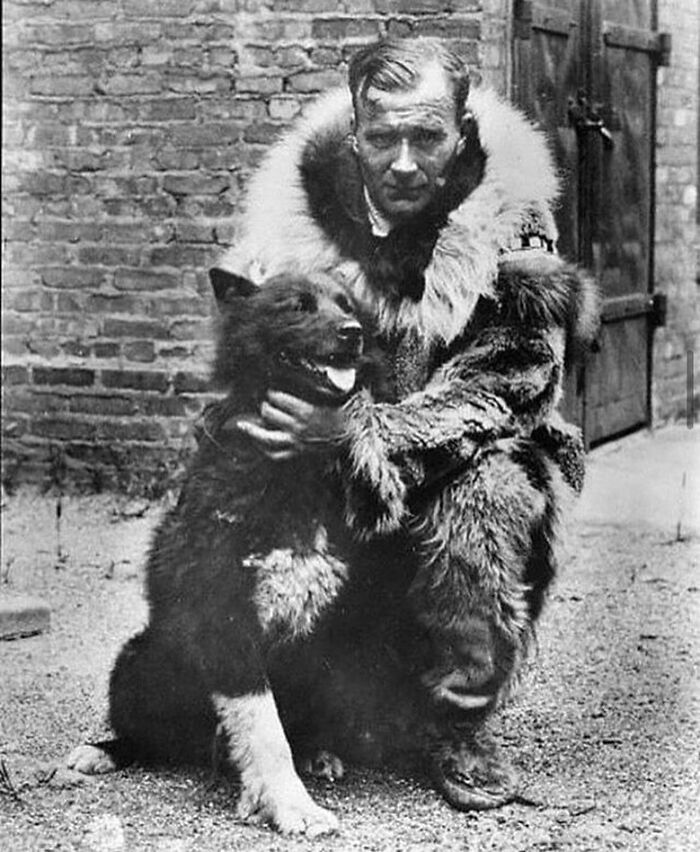
Image credits: historicaleaks
#42 Portrait Of A Family In Gainesville, Florida, C. 1900s
The nineteenth and twentieth centuries were a time of radical transformation in the political and legal status of African Americans. Americans were freed from slavery and began to enjoy greater rights as citizens (though full recognition of their rights remained a long way off)
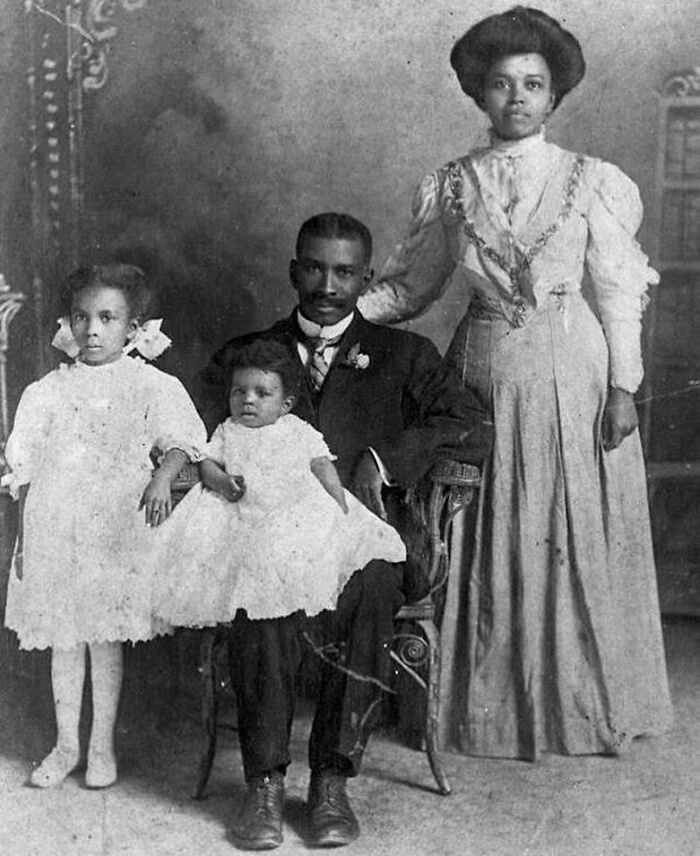
Image credits: historicaleaks
#43 A Woman Dressed Up As Batgirl In 1904, 35 Years Before The Creation Of Batman (1939) And 57 Years Before The Creation Of Batgirl (1961)
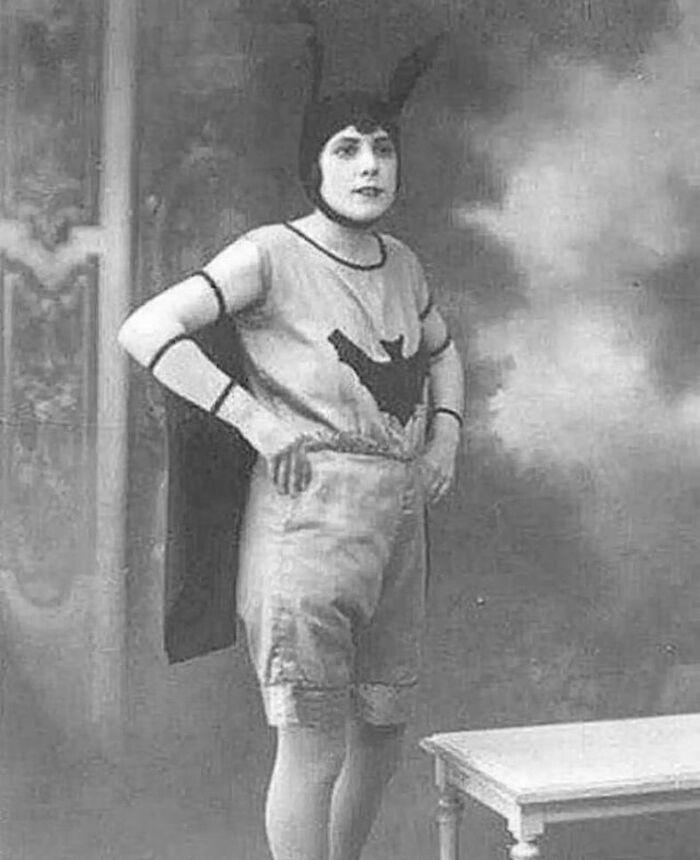
Image credits: historicaleaks
#44 The Mother As A Creator By Annie Wang, She Started A 17-Year Project Before Her Son Was Born, Documenting Her Child Growing Up, Taiwan, 2001

Image credits: historicaleaks
#45 Kindergarten Children Were Asked On Father’s Day To Draw From The Memory Portraits Of Their Dads, And Then Compared Them To The Original, Life Magazine, USA, 1949
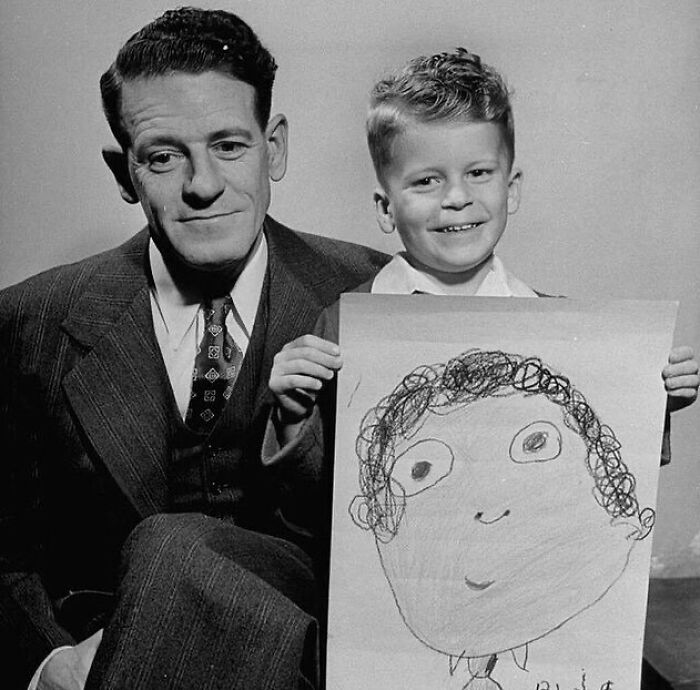
Image credits: historicaleaks
#46 ??
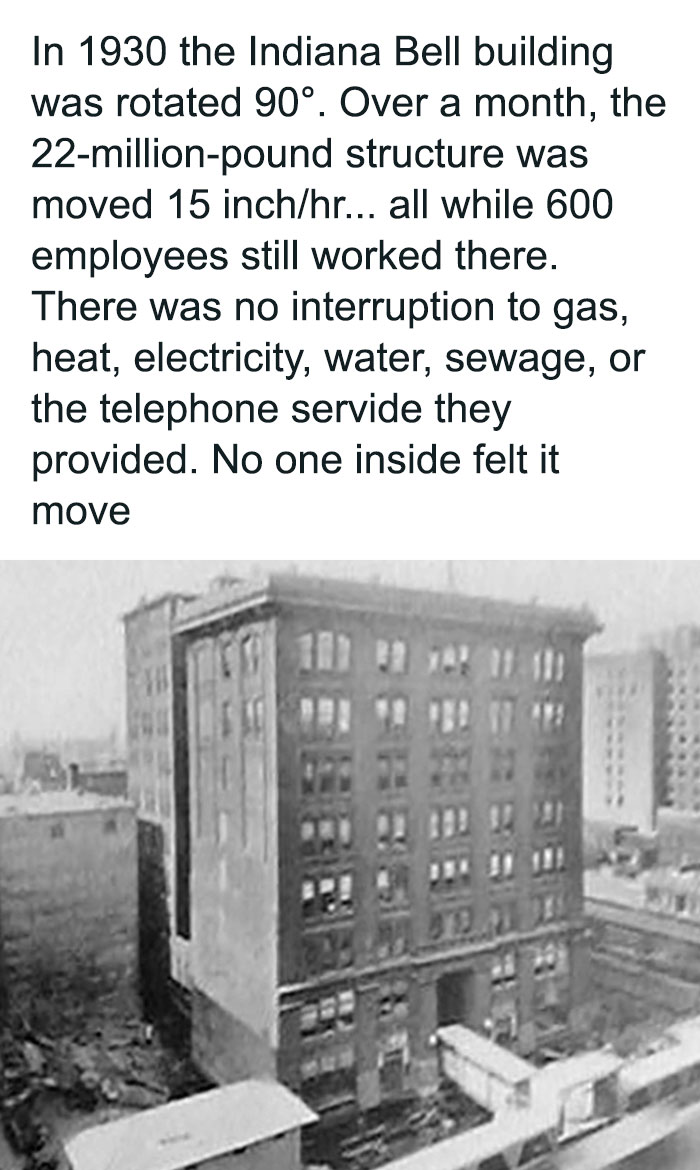
Image credits: historicaleaks
#47 Parisian Woman With Her Cat In Her Cannabis Garden, 1910s
Original caption: “This lovely young Parisian woman is enjoying a serene moment in her lush garden in the 1910s in France. Her companions are her fluffy faithful feline and her caged bird. Keeping songbirds as pets is a hobby as old as the ancient Sumerians, but small home aviaries became a status symbol in the 1800s and early 1900s. Likely, this young lady enjoyed the company of her birds as a way to connect with nature. Interestingly, her garden contains several cannabis plants. It could be that the unique leaves and vibrant foliage was sought after as a garden plant. Or it could be that the young woman or her family were utilizing the medicinal properties of the cannabis plant to treat any one of a number of ailments.”
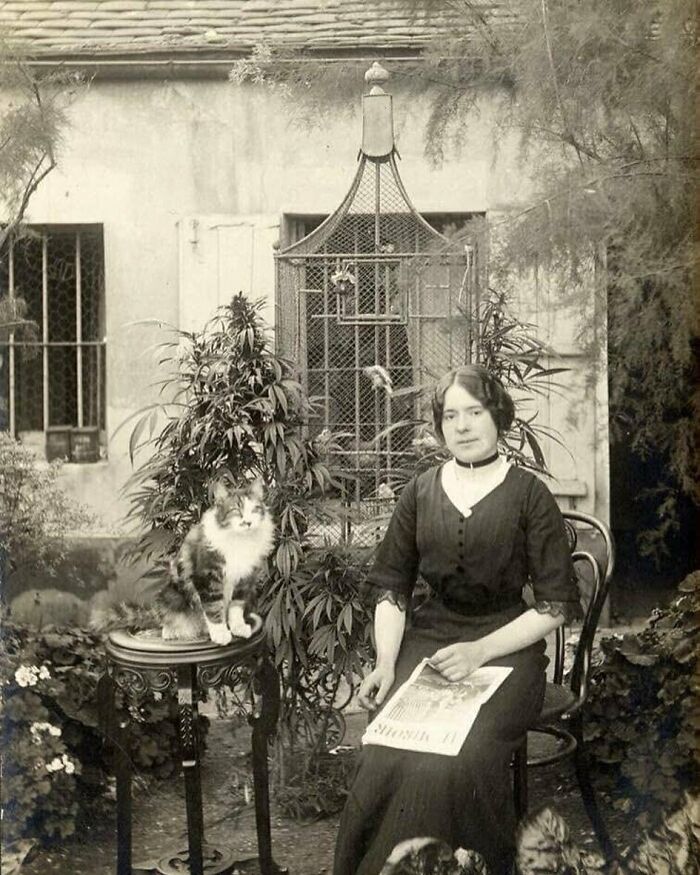
Image credits: historicaleaks
#48 Princeton University Students After A Snowball Fight, 1893. In The Photo Are, From Left, Darwin R. James, John P. Poe, And Arthur L. Wheeler
Before the turn of the 20th century, it was tradition for Princeton students to have snowball fights between the freshman and sophomore classes
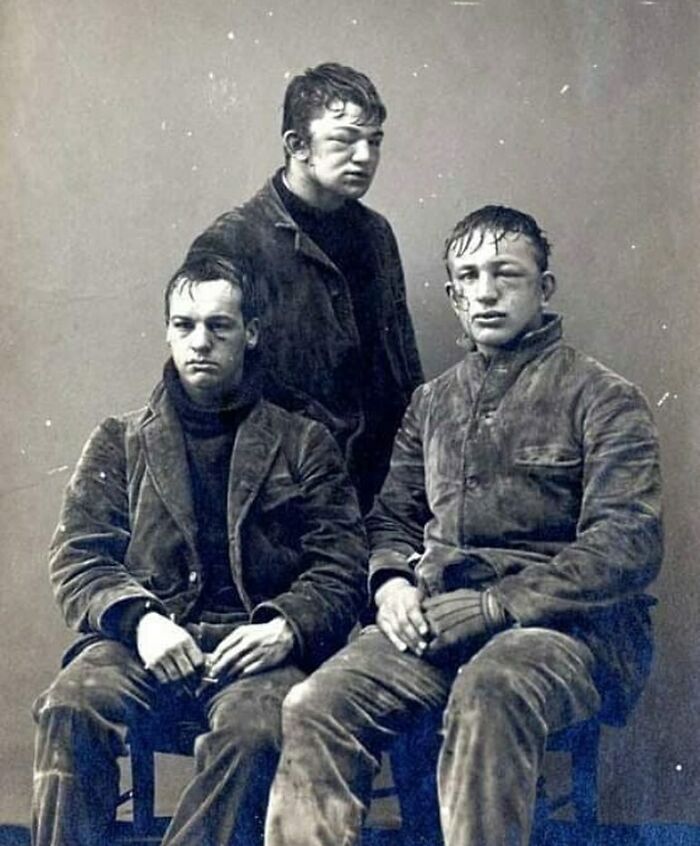
Image credits: historicaleaks
#49 Ella Harper (1870-1921), Also Known As The Camel Girl
Ella Harper was born with a very rare condition that caused her knees to bend backwards, called congenital genu recurvatum. Her preference to walk on all fours resulted in her nickname Camel Girl. In 1886 she featured as the star in W. H. Harris’s Nick Patel circus, appearing in newspapers wherever the circus visited. Ella Harper received a 200$ salary per week during her career in the circus
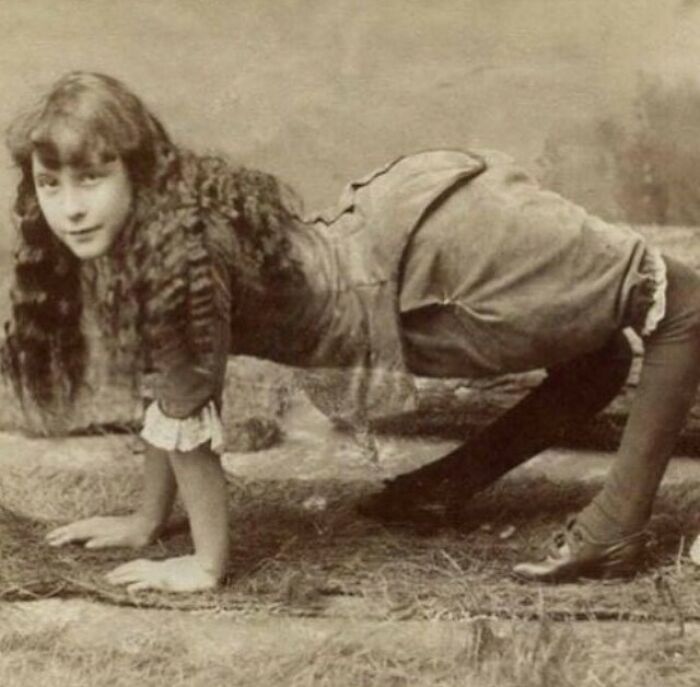
Image credits: historicaleaks
#50 Michelin Men In The 1920s
Michelin was founded in 1888 by the Michelin brothers, André (1853–1931) and Édouard (1859–1940), the company manufactured tires for bicycles and horse-drawn carriages before introducing pneumatic tires for automobiles in the 1890s. In 1926, Michelin began reviewing restaurants so that more people would travel further distances in their cars to eat at these restaurants. This in turn would wear down their tires faster, and force them to buy more. The star system that Michelin uses goes up to three and is broken down by whether or not it's worth driving to the restaurant. One star: "A very good restaurant in its category" (Une très bonne table dans sa catégorie). Two star: "Excellent cooking, worth a detour" (Table excellente, mérite un détour). Three star: "Exceptional cuisine, worth a special journey" (Une des meilleures tables, vaut le voyage).
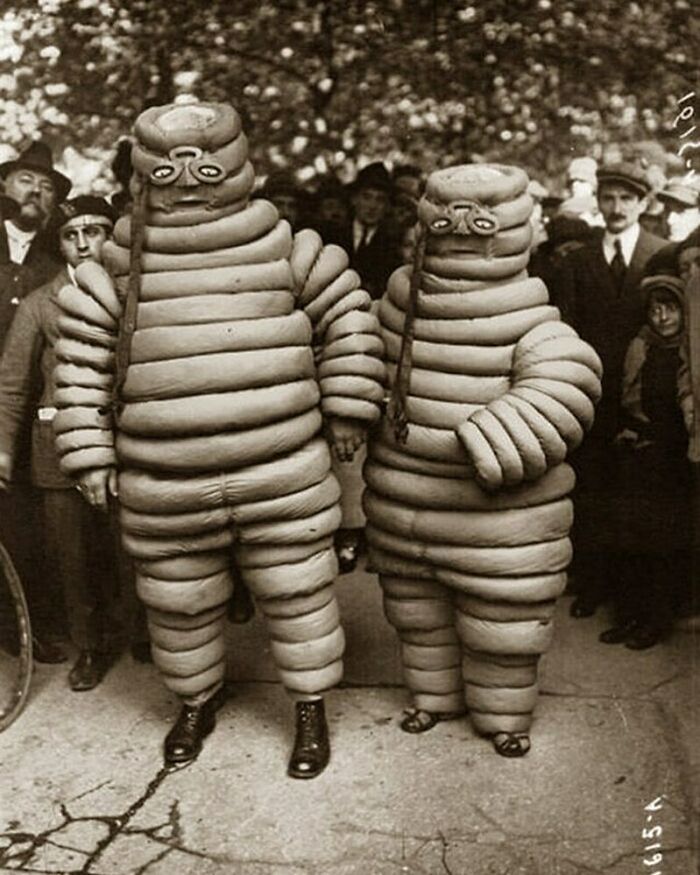
Image credits: historicaleaks

